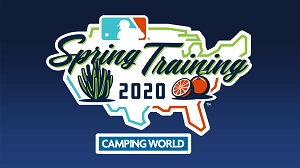Prospect Smith provides own scouting report
This browser does not support the video element.
DUNEDIN, Fla. -- Kevin Smith is always looking for ways to get better.
But last year, the 23-year-old infielder learned that getting away from what made him successful in the first place isn’t always going to lead to improvements. Before spending all of the 2019 season at Double-A New Hampshire, Smith made offseason changes to his swing that eventually led to a .209/.263/.402 slash line in 116 games with the Fisher Cats, to go along with 19 homers, 22 doubles, two triples and 151 strikeouts.
Now, Toronto’s No. 23 prospect and 2017 fourth-round Draft pick out of the University of Maryland is just trying to get back to basics and keep moving up the organizational ladder.
“I feel really good,” Smith said. “I’m getting back to what I do well, trying to limit stuff that I was trying to get better at that actually ended up messing me up a little bit. I’m trying to stay focused on what I’m good at and do that more often and keep it simple.”
Evaluating himself using a Major League Scouting Bureau report and the 20-to-80 scouting scale, basing his grades on the standards set by the Bureau, Smith offered insight into the belief that he just needs to play to his potential to find success on the field.
Top tools
The native of East Greenbush, N.Y., gave himself the highest future grades in fielding and baseball instincts, offering an above-average present evaluation of both, and keeping his grades consistent for the future.
“Growing up, I was never a huge guy or a big prospect,” Smith said. “So I worked on defense more because I knew that could get me where I wanted to go. Throughout high school and travel ball, my coaches put a big emphasis on it, and when I got to college, [former Maryland head coach] John Szefc made sure we were always working on defense. It’s something I always took pride in and gets overlooked nowadays with hitting homers and that stuff.”
Room to improve
Keeping almost all of his evaluations consistent from present to future, Smith jumped his hit tool one grade, from below average to average, believing that his ability to hit is where he can take the biggest strides.
“Facing more pitchers who are really good will help me,” he said. “Growing up in New York, we don’t face many studs like guys in Florida and Georgia. Going to Maryland, we started in the ACC and then we were in the Big 10 so we didn’t get to face the power arms in the SEC or ACC very often. Last year [in Double-A] was really the first year where we faced studs day in and day out. The more you get used to them, the more comfortable you get with them, the more you can settle down and put your plans in place and become a smart hitter.”
Scouting the scout
Offering insight into his own game and grades, the infielder didn’t bring a wealth of experience in grading and scouting to the table when he filled out the evaluation.
“People around me probably know more than I do,” Smith said. “I don’t take a peek at this kind of stuff a lot. Back in high school and college it was a bigger deal, but it’s all changed since then. They were grading you based on other people, not really on the skills. I’m not very acquainted with the scouting report system.”
What the scouts say
“He’s one of the Blue Jays’ highly-touted prospects, and when I saw him last year in New Hampshire, he was disappointing,” one scout said. “He showed some power, but a lot of swing and miss and sometimes he just looked lost at the plate. Defensively, he works hard and he can help in the field but he’s going to need to make more contact to keep moving.”
What’s missing
“Just what happens when you’re under pressure,” Smith said of what the scouting report doesn’t say about him. “What happens when the game speeds up on you and it’s a big situation, when you’re in the box and it matters to your team and to the fans and they bring somebody in to pitch against you in the eighth or ninth inning, and you’ve got to lock in and stay focused and not let the pressure get to you.
“All that’s getting torn out of baseball with all the scouting and the analytics nowadays -- they’re not focusing on the humans and their mindset, their confidence level going up to the plate, how comfortable they are in certain situations. Guys get overlooked or surprise people when they get to a level and start performing, or they don’t, because you can’t grade that.”
